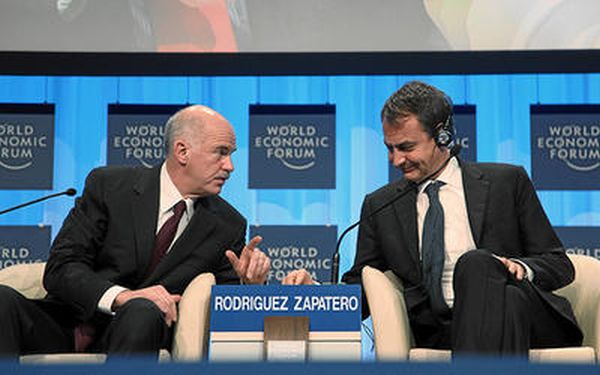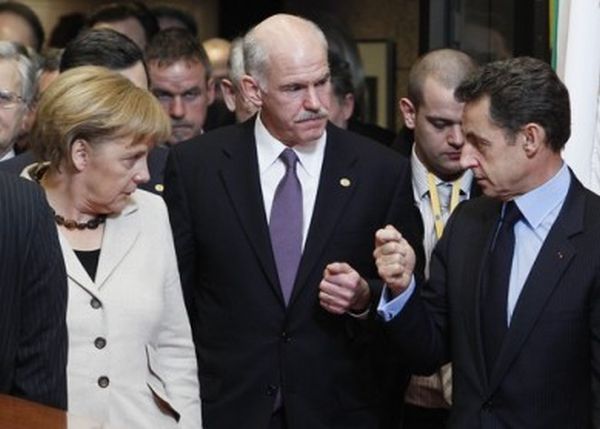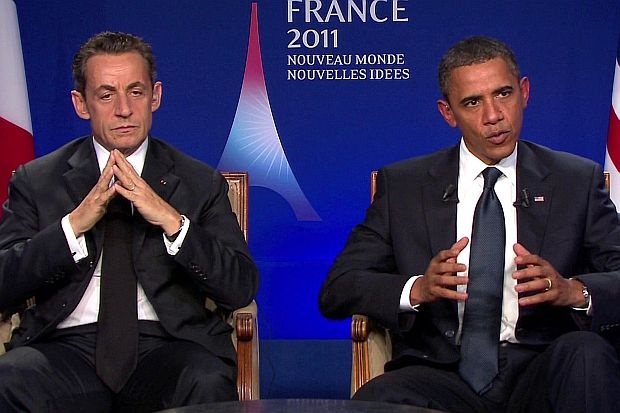The book by former Spanish Prime Minister Jose Luis Rodriguez Zapatero "El dilema. 600 dias de vertigo" ("The Dilemma: 600 Days of Vertigo") gently lifts the curtain of the European meetings and summits, allowing its readers to look behind the scenes.
The book reveals some of the processes that happened in the critical period from the end of 2009, when George Papandreou’s government had dramatically put the Greek issue in the spotlight, to November 2011, and during the turbulent G20 summit in Cannes, which was followed by government turmoil in Greece and Italy.
As one could see, the author is particularly concerned about the Greek issue. The word "Greece" repeatedly appears in the titles and subtitles of the chapters and, in total, 160 times in the book. It is significant that "France" and "Germany" appear 42 and 76 times respectively.
Spain’s former socialist Prime Minister always speaks with respect for George Papandreou and avoids directly criticizing him.

Jose Luis Zapatero demonstrated such a position of sympathy and understanding in Cannes in November 2011, when the whole world criticized Papandreou who was losing his positions in Greece at that time as well.
In the chapter entitled "DE NUEVO Grecia ... Y AHORA ITALIA?" (Greece again ... and now Italy?") Zapatero writes the following:
"We arrived in Cannes shocked by the Greek Prime Minister Papandreou’s initiative to hold a referendum on the unstable Eurogroup agreement of 26 October. This agreement provided for new cuts in Greece, for the 50% involvement of private banks in its rescue and for the increase of the amount of the European Financial Stability Facility to 1 trillion euro. (...)
The idea of the referendum came as a thunderbolt to the euro zone governments and Brussels. The following days were particularly restless. It seemed that the pitcher would go to the well and that the euro would explode.
Thoughts were automatically put together. If the referendum were held its result would probably have been negative. In this case, no financial support would have been granted and the probability of default would have been inevitable. Moreover, its implications would have been unpredictable, one of them being a possible shock and massive spreading of the effect to the weaker euro zone countries."
"I indicated the risks to him"
In those days, I repeatedly spoke with Papandreou, in person, about his initiative. I indicated to him, with all the due respect that I feel for him, the considerable risks accompanying his surprising proposal. It was not easy to tell Papandreou something that would sound like a reproach.
Always reticent in the days before he resigned, he was telling me how isolated he was feeling because of the financial and social situation in his country. The government was facing increasing difficulties in parliament, after so many plans for consolidation and cuts in public spending, and the economy and employment were getting worse. At the same time, the Troika was becoming more persistent. "I cannot stand any longer", he told me... I understood him and stopped raising the issue of the referendum."
In the very first pages of his book, Zapatero explains how the Greek issue had become the central problem of the world economy. He describes the atmosphere of calm and restrained optimism reigning in Europe that was rapidly torn to pieces during the European meeting in December 2009.
"Then during the summit the newly elected Prime Minister of Greece began to read a detailed and transparent report on the state of the Greek economy and on the public finances in particular.
The report was shocking, gloomy. After bluntly presenting the dynamics of the deficit and public debt, Papandreou described a number of peculiarities of the Greek public administration. I do not want to mention the details of the things described by the Greek Prime Minister in relation to the pensions, bonuses for civil servants or the difficulties of determining the state property, out of respect for him and for his country, which experienced so much pain during the crisis.
George Papandreou won the confidence of the council due to his seriousness and sincerity, and his detailed description of the situation had not left European leaders indifferent. The faces of a number of heads of state and prime ministers showed their surprise and some showed sympathy for the Greek Prime Minister."
The fuss in the following weeks was unprecedented and the events took place at breakneck speed. In January, Zapatero spoke with Papandreou many times. "He shared his dissatisfaction with the actions of some European countries. At that time, George Papandreou claimed with some pride that his country could cope alone with the situation and the more responses by the European partners he saw, the more he was convinced that he should not ask for any help."
The first summit entirely dedicated to the Greek issue took place on 11 February 2010 and, according to Zapatero, it was "daunting. Papandreou wanted to get more understanding than help. (...) And strongly willing to preserve national pride, he said that, for the moment, he would not ask for help, that he would continue to rely on the markets and that, seeing the European reaction, he was considering the probability of requesting help from the International Monetary Fund."
As is known, this position of the Greek government survived for a short while and it resorted to financing the memorandum in April. Several days later and just before the ratification of the agreement by the European institutions and the member states’ parliaments, Zapatero talked with George Papandreou.
"I talked with Papandreou on 2 May. He was exhausted but he spoke in a firm voice. He was determined to trigger the requested cruel austerity plan in exchange for a bailout. At the same time, however, he confessed with pain and some resignation that he had not felt sufficient European solidarity. He asked me to speak to Merkel. I promised to do so and I talked with her on Thursday, 6 May, a day before the extraordinary summit. (...) The next day the German Parliament had to approve the bailout to Greece. (...) The Chancellor, however, knew that the plan for Greece was not enough and that the markets were beginning to accept the idea of the transfer. At the same time, the extraordinary summit had to take drastic measures to stop the attack against the euro and the considerable market instability."
"What do you want as a guarantee? Is it the Parthenon?"
Over time, the position of Greece internationally and its financial performance were getting worse. Its position was even more difficult because it depended on countries the governments of which wanted to look firm and steadfast in the eyes of their citizens.
In his book Zapatero speaks about the meeting in the summer of 2011 which was dedicated to the second bailout to Greece, mentioning "the severe difficulties posed by certain countries, such as Finland, with their endless demands."
He also states, "Those were perhaps the worst moments I had experienced among the European partners. It was three o'clock in the morning and we could not reach an agreement on the 0.25% interest, as they constantly wanted more and more guarantees from Greece. "What do you want? Is it the Parthenon or the Greek islands? How far do you want to go? Is that what you want as a guarantee?", Papandreou was forced to call out indignantly; they had pushed thus far this otherwise calm and moderate politician.
France’s "contribution" during the summit in Cannes
Zapatero’s book again brings to the surface all publications in the French press which, at that time, had repeatedly dealt with the excessive pressure upon George Papandreou exerted mainly by former President Nicolas Sarkozy and Chancellor Angela Merkel.

According to the publications of the time, Sarkozy was not hiding his anger over the Greek referendum that threatened to collapse the euro zone as it could lead to Greece's exit from the euro. According to "Le canard enchaine" newspaper, after the G20 summit in Cannes, the French President told his ministers, "Papandreou is an idiot (con), he is a real j..k (connard). He shocked us all from G20. In Brussels, he had told us that he would accept the bailout and then informed us about the referendum, without warning us. That was a low blow. This is really scandalous. And after all this, now I have to thank him."
According to "Le Parisien" newspaper, after the scandal in Cannes, during a meeting with President Barack Obama, Sarkozy described Papandreou as "crazy" and "depressed".

Indeed, as the Finance’s Minister of France at the time, Francois Baroin, writes in his book "Diary of a Crisis", the "thriller" for Papandreou in Cannes lasted two hours during which Sarkozy was so much beside himself with anger that he was yelling at Greece’s Prime Minister, "you are a f...ing psycho" and "you cannot humiliate the President of France in this way."